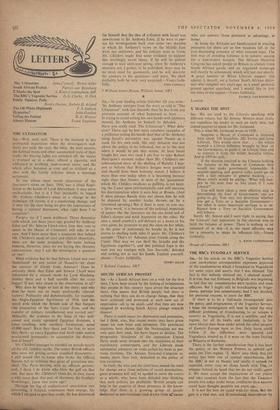The Ultimatum John Connell Henry Adler South African Protest Patrick
van Rensburg X Marks the Spot S. Knox Cunningham, MP Tice BBC's Yugoslav Service D. L. Clarke, 0. Pick Public Opinion Polls Henry Durant, Robert D. Acland The Off-White Highlands F. S. Joelson Hypocrisy? John Gordon 'Felling the l'atient R. G. Weaver Almost Human Frank Singleton THE ULTIMATUM
SIR,---Well, well, well. There is the moment in any protracted inquisition when the investigators sud- denly put aside the rack, the whip, the steel pincers, the hobnail hoots and other accustomed tools of their trade; the blazing lights are switched off; the victim is propped up in a chair, offered a cigarette, and addressed in soothing, man-to-man tones; and the whole affair becomes as cosy and as civilised as a chat with the family solicitor about a marriage settlement.
In one whose most recent experience of the Spectator's views on Suez. 1956. was a ritual flagel- lation at the hands of Lord Altrincham, it may seem uncharitable, but it is I fear inevitable, to regard Mr. Erskine Childers's essay as a change in the technique, Of course, it is a comforting change; and if only for the time being we give the appearance.of having a rational discussion, what right have I to complain?
Forgive me if 1 seem stubborn. Those demoniac yells which, just three years ago, greeted Sir Anthony Eden and Mr. Selwyn Lloyd every time they rose to speak in the House of Commons, still echo in my ears. And I have more than a suspicion that behind Mr. Childers's mask of cool and clinical objectivity, there are the same prejudices. the same lurking hysteria. However, since we are having this chummy conversation, may I ask the investigator a question or two?
What evidence has he that Selwyn Lloyd was ever 'humiliated' by any action of Nasser's—let alone the ejection of Glubh from Amman? Does he seriously think that -Eden and Selwyn Lloyd were influenced by a remark made by Lord Hinching- brooke three and a half months after the crisis began? If not, why chuck in the observation at all?
Why does he begin so late in the story, and why does he leave out so many profoundly relevant factors? Politically and diplomatically, for example, the Anglo-Egyptian Agreement of 1954. and the speed with which the British side of that bargain (the evacuation of the Suez Canal Zone, and the transfer of military installations) was carried out'? Militarily, the presence in the Sinai of two well- armed and newly equipped Egyptian divisions, a force totalling, with ancillary formations, some 45,000 men? Were they there just for fun, or were they there—as every Egyptian and Arab radio station proclaimed incessantly—to accomplish the destruc- tion of Israel?
Mr. Childers manages to marshal on parade nearly all the old, familiar myths. The senior British officials who were not getting certain classified documents— I still would like to know who broke the Official Secrets Act to ventilate that piece of gratuitous mis- chief. Tice Paris meeting with no officials present; well, I think I do know who blew the gaff on that one. But does Mr. Childers? Does he, in fact, know a whit more than that pair of charmers, the brothers Bromberger, knew two years ago?
Through his fog of sophisticated speculation one interesting, if belated, conclusion does emerge, for which I am glad to give him credit. He has discovered for himself that the idea of collusion with Israel was unwelcome to Sir Anthony Eden. If he were to pur- sue his investigations back over some two decades in which Sir Anthony's views on the Middle East were not unknown, and his policies were in force, Mr. Childers might find some evidence to support this startlingly novel thesis. If he will be patient enough to wait until next spring, when Sir Anthony's memoirs are, I gather, to be published, there may be no more need for guesswork, and he will discover the answers to his questions—and mine. We shall probably both be very, very surprised.—Yours faith- 7 William Street .House, William Street, SWI






































 Previous page
Previous page